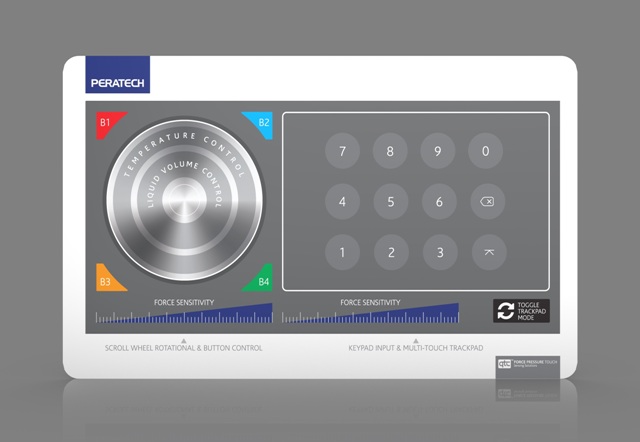Peratech, the innovators in touch technology, will be launching a new touch screen industrial controller demo at Hannover Messe 2015, the world’s leading trade fair for industrial Technology (http://www.hannovermesse.de/home).
 Peratech's force-sensing keypad
Peratech's force-sensing keypad
The demo uses Peratech’s standard keyboard sensor with Peratech’s Opaque QTC® force-sensing technology, which accurately measures both the amount of pressure applied to the keypad and its precise location. Peratech QTC force-sensing technology is more accurate than capacitive touch screen technology, making it much safer as it detects only actual touches so there are no false touches. As an integral part of a total HMI (Human Machine Interface) solution, QTC technology offers many advantages over capacitive and other existing touch solutions – greater safety, greater accuracy, better consistency, and higher reliability, in a cost effective solution with low EMI, power, and size constraints.
Peratech’s interactive demonstration, hosted by Haute Innovation (www.haute-innovation.com) on stand E52 in Hall 6 at the Hannover Fair, is an example of a boiler control for water volume and with temperature levels that can be controlled using the QTC custom touch panel even when wearing heavy-duty work gloves. “Manufacturing environments are traditionally hostile to electronics, but this is where Peratech’s technology advantages become really compelling,” said Jon Stark, Peratech’s CEO. “QTC technology gives added true-force detection sensitivity that we believe no other technology can provide and performs consistently at temperatures as lower than -20C and higher than +60C. Our QTC technology can work behind a variety of surfaces including glass, metal, plastic, etc. giving the flexibility to create buttons, slider controls, and dials wherever on the surface we like, so that we can offer the ultimate in cost-effective, customisable control interfaces.”
Another key advantage of QTC force-sensing technology is that it uses less processing power compared to projected-capacitive solutions. Because QTC material changes its resistance when pressure is applied and only at the point where pressure is applied, QTC-based sensors give accurate position and pressure data that needs only minimal microcontroller processing. By contrast, a capacitive touch screen generally requires a more expensive microprocessor running more complex maths as it has to “make an educated guess” where applied touch occurred because it has no reference to how hard someone might have pressed the surface. The overall power budget is also less with a QTC-based solution as it only requires power when touched, unlike capacitive that always has its sensing field powered up and thus draining the battery life.
“We recently acquired a software team specifically to enable us to create HMIs,” added Jon Stark. “This gives us the skill set to design and create complete sensor and control solutions from the QTC sensors, though the embedded electronics to the GUI. Customers want a rapid solution to their problem that gets them to market faster than their competition does/can, and we can now provide that complete plug-and-play sub-assembly. Having our software team means that we can now rapidly provide turnkey solutions today for current and future industrial control challenges.”